Trinidad & Tobago
Experts say no to TT dollar devaluation
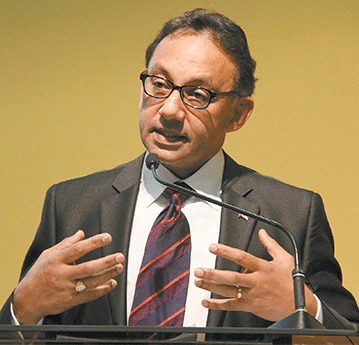
Port-of-Spain – Devaluation of the Trinidad and Tobago dollar would not help the country's foreign exchange crisis, former government ministers Mariano Browne and Vasant Bharath have said. Both men were responding earlier this week to questions raised by Pointe-a-Pierre MP David Lee about Trinidad and Tobago being in a forex crisis.
Lee recently based this question after Republic Bank decided last month to reduce the maximum US-dollar spending limit on credit cards from (US) $15,000 to $12,000. The measure takes effect from January 20. Credit-card limits below this amount (approximately TT $81,000) will remain unchanged. The US-dollar spending cap will also apply to all transactions at merchants outside Trinidad and Tobago, including online transactions, even if the billing currency chosen is in Trinidad and Tobago dollars.
Browne said the forex crisis “has never been far away”, adding, “We have a continuing forex crisis.”
Since Trinidad and Tobago has a floating exchange rate, Browne explained, the rate adjusts in response to forex demand and supply issues. While there may be need for some exchange-rate adjustments over time, Browne said there is no need for a devaluation.
He said boosting Trinidad and Tobago’s exports could increase the amount of forex in the system. But he added there remains a high dependence on imported goods. Until challenges such as these are addressed, Browne said Trinidad and Tobago’s forex capacity will be challenged and there will only be temporary relief at times.
He said the limit on US expenditure on credit cards does not help or hurt the forex situation unduly. Browne explained that banks sign international agreements with credit card companies and must meet their commitments to them.
He continued that restricting the spending limit on credit cards means people who bypassed the forex window in the bank must now return to get the forex they cannot access through their cards. It would now make it harder for some businesses and suppliers to do business.
Browne also said efforts must be made to restore public confidence in the system to reduce the risk of hoarding of US dollars or turning to the black market for access.
Bharath identified encouraging foreign direct investment through tax incentives, ease of doing business, public service reform, getting a handle on crime and creating a more facilitative and welcoming environment for FDI as possible solutions to Trinidad and Tobago’s forex problems. In the short term, Bharath suggested the use of forex for luxury items like champagne and high-end vehicles, “should be restricted by the imposition of additional duties”.
He said Republic Bank's decision shows that “clearly the banks are not getting the amounts required to fulfil the needs of their customers”.
Bharath said this is a direct result of reduced forex inflows as a result of depressed world prices. He said it also points to “reduced production and a lack of confidence – hence no FDI”.
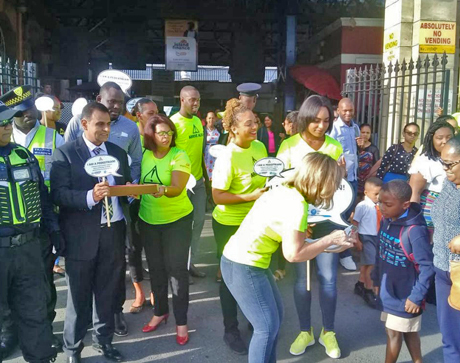
Arrive Alive president Sharon Inglefield shares road safety tips with pedestrians while Transport Minister Rohan Sinanan and Road Safety Co-ordinator Constable Brent Batson and members of Arrive Alive team look on. (Newsday Picture)
The concern was expressed last week by Arrive Alive President Sharon Inglefield, who called on the government to implement more infrastructural road safety “furniture” to prevent the loss of lives.
Inglefield said guard rails, cable barriers, proper signage, traffic lights, painted cross walks, walkovers and sidewalks were among the list of “furniture” necessary to ensure safety for pedestrians and motorists.
She said statistics compiled by Arrive Alive showed last year there were more fatalities involving passengers than drivers. Inglefield attributed this to many backseat passengers not fastening seat belts.
“We had many more passengers die in 2019 than in the previous year. A number of rear seat passengers did not wear their seat belts and were thrown from the vehicle. That is another area we have to look at in terms of legislation,” she said.
She also noted an increase in fatal collisions involving concrete utility poles.
The association’s statistics showed in 2018 there were seven collisions with seven fatalities; however, in 2019 there were 16 fatalities from nine collisions.
The statistics also showed a 17 percent increase in collisions on highways and main roads, and a 92 percent increase in fatalities.
In a tragic accident, on December 19 four people, among them former national footballer Shahdon Winchester, were killed after his vehicle crashed into a utility pole along the Solomon Hochoy Highway. Winchester’s SUV slammed rear-first into the utility pole, bringing down a 50,000-volt transformer onto the vehicle.
Arrive Alive had said Trinidad and Tobago’s utility pole location standard was not in keeping with the United Nations’ “more forgiving” roads; that there was a lack of standards for the design and installation of poles close to roadway traffic.
“We urge our leaders to remove all these poles which contribute to the loss of life on our roadways, and to please also install guard rails where relevant,” Inglefield said.
She noted that under the Motor Vehicles and Road Traffic Act, the Ministry of Works and Transport increased the speed limit to 65 kilometres per hour around the Queen’s Park Savannah and the Valencia By-Pass Road. The order came into operation on December 30, 2019.
“All over the world, most especially around schools and neighbourhoods, speed is being decreased due to vulnerable road users like pedestrians and cyclists. In this country we are raising speed limits at a time and during a year when we have had an increase in deaths! This is sending the wrong message to the reckless amongst us,” Arrive Alive noted in a post on its Facebook page.
Said Inglefield: “We have to do the right thing and not the popular thing. Pedestrians do not have the armour of a vehicle. Around the Savannah there is a high volume of school children and pedestrians. Where are the safety measures? It’s imperative that we protect our pedestrians, mainly our school children.”
Meanwhile, the high cost for maintenance to the high-tension cables lining the Uriah Butler and Solomon Hochoy Highways is the reason the system is now in disrepair, Minister of Works and Transport Rohan Sinanan said last week.
Sinanan said fixing these barriers, which were first installed in 2010, remains an ongoing process in the ministry, which is continuing to analyse areas in need of repair.
“It's an ongoing process. Once a vehicle forcefully comes in contact with these barriers, there is damage for kilometres from the crash. The damage is not isolated to one area. These cables are easily breakable and very hard to fix. So we are in the process of fixing as many as we can,” he said.
He also claimed given the easily breakable nature of the system, it has become very taxing on the ministry to fund such repairs.
“It is very, very expensive. Previously we had a contractor whose responsibility it was to repair these barriers. However, we have since moved these operations in-house to spare some of the costs incurred. I would say that in 2016 we were owing the contractor around (TT) $17 to $18 million in repair costs. This heavy cost is the reason we had to opt to move in-house,” he said.
He added alternative solutions were being considered, but not yet implemented. One solution was Jersey barriers, either concrete or plastic, to separate lanes of traffic, which minimises vehicular damage and lane crossovers. Following Sinanan’s revelation, Inglefield called on the ministry to complete an analysis of the areas in question, and for more cost-effective fixes.
“We have been having extensive conversations with the ministry, and given that the minister has expressed some concern with the current situation, we have requested that an analysis be done with regards to installation and maintenance. Cable barriers are expensive, but there are various types of barriers offered by hundreds of suppliers. Therefore cable barriers are not the only solution at hand,” she said.
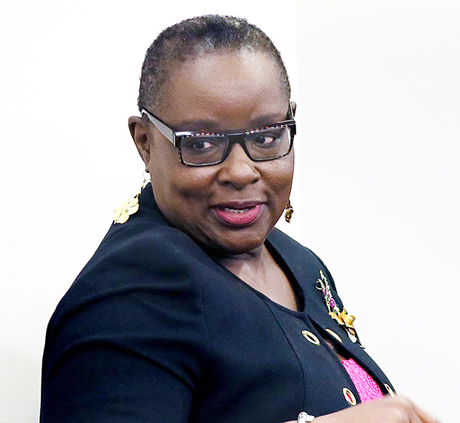
Last week former head of the public service Reginald Dumas questioned Rowley’s move of one of his most senior ministers. Only Rowley knew the answer, Dumas said.
On December 31, 2019, Rowley announced the reshuffle, with one of the significant changes being the reassignment of Leader of Government Business Camille Robinson-Regis as Minister of Planning to the Ministry of Social Development.
Minister of Social Development Cherrie-Ann Crichlow-Cockburn was replaced by Robinson-Regis.
Crichlow-Cockburn was demoted to Minister in the Ministry of Planning, now held by Rowley. Senator Adrian Leonce was shifted as parliamentary secretary in the Ministry of Public Utilities and reassigned as parliamentary secretary in the Ministry of Works and Transport.
Government Senator Foster Cummings was appointed parliamentary secretary in the Ministry of Rural Development.
Dumas said he understood the movement of Leonce as parliamentary secretary in the Ministry of Works and Transport to assist Minister Rohan Sinanan, as well as the appointment of Cummings as parliamentary secretary in the Local Government Ministry to assist Local Government Minister Kazim Hosein.
He said these were both heavy portfolios that would require assistance, especially with local government given the recent results of the local government election.
“Is it being said that the lady in Social Development was not doing a good job? I don’t know. Is he saying that Robinson-Regis was not doing a good job? I don't know. It puzzles me as to why that particular reshuffle took place at this time,” said Dumas.
Given the shift, it did not leave the incumbents much time to learn their new portfolios, he added.
Political analyst Dr Winford James said the most important shift was the one taken by the Prime Minister to assume control of the Planning Ministry. He said any move by the Prime Minister in this election year might be interpreted as an election move.
However, he said only Rowley can give an account as to why he took these decisions, and what he hopes to achieve from them.
“Is Camille falling out of favour? Is there something happening with Crichlow-Cockburn, and is Cummings being groomed for something bigger?” James wondered.
Analyst Dr Bishnu Ragoonath said the reassignment of Robinson-Regis to the Social Development Ministry could be seen as a demotion, since the Planning Ministry was one of the most “highly-held” ministries.
Ragoonath said there could be a ‘political angle” in that the Prime Minister feels that Robinson-Regis is “closer to the ground” than the previous minister.
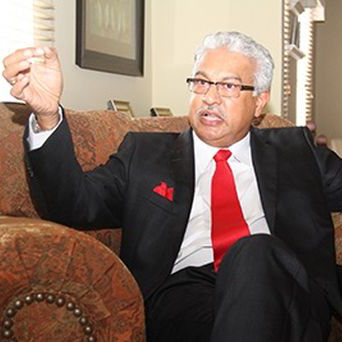
In the light of these troubling statistics, Deyalsingh said vaccine hesitancy continues to pose a challenge for the Health Ministry. According to the World Health Organisation, vaccine hesitancy is the reluctance or refusal to get vaccinated despite the availability of vaccines. WHO says this threatens to reverse the progress made in tackling vaccine-preventable diseases.
Deyalsingh once again pleaded with the public to get the flu vaccine, saying it could mean the difference between life and death. He also criticised Caroni East MP Dr Tim Gopeesingh, who had questioned the safety of the vaccine during a recent contribution in Parliament.
Gopeesingh said he was unsure whether to recommend the vaccine to his pregnant patients as there was a “raging controversy” on the complications of the vaccine in young children and pregnant women. However, Deyalsingh denied a controversy existed.
“Don't get caught up in the anti-vaxxers talk. The vaccine is safe. It will significantly decrease your risk of dying,” he said.
He noted the 37 flu-related deaths last year represented an increase from previous years, but he said influenza was not a Trinidad and Tobago problem, but a global one. Deyalsingh said 61,200 people in the US died from influenza last year, “and they considered that a victory because they anticipated in a normal flu season 79,400 would have died”.
He added people were reluctant to get the vaccine because of previous experiences where they got vaccinated, but still fell ill.
“Every year we have to say it. The influenza vaccine protects you against H1N1, H3N2 and Influenza B, it does not protect you against the rhinoviruses or other viruses that cause the common cold. The common cold will not kill you, what will kill you is this, and if we do not get the message across again, if the anti-vaxxers in our communities continue to be more successful than us, we are going to have a problem with Carnival,” he warned.
Deyalsingh said with the flu underway across the US, North American tourists coming to participate in Carnival festivities will arrive with the virus. There was no way to stop this as screening for influenza at ports of entry is impractical and against international health rules.
“What we have to do is protect the local population. If the population does not heed this warning we are going to have more deaths,” he said.
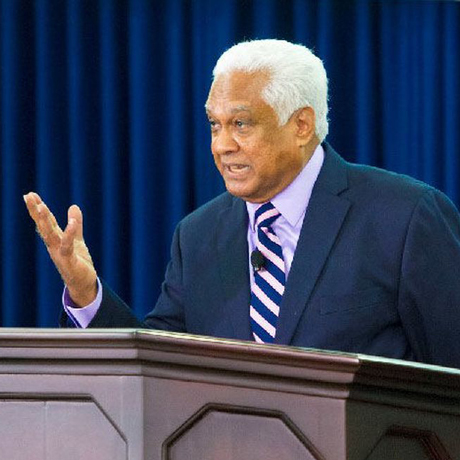
Following the revelation of the cold, hard cash in Trinidad and Tobago’s old $100 bills, several religious heads said while they did not want to “jump to conclusions”, the feeling was the cash accumulation was abnormal, and a cause for concern.
According to the reports, Longdenville pastor Vinworth Anthony Dayal, leader of the Third Exodus Assembly Church, attempted to exchange (TT) $28,046,500 in old hundred dollar bills late last year at the Central Bank. He was seeking to exchange the old bills for the new polymer $100 notes. The money was presented in 29 copy-paper boxes, and was seized by the officers of the Financial Investigation Branch under the Proceeds of Crime Act. Police later seized around $2 million more on the premises of the church.
Commenting on the issue, Pundit Lutchmidath Persad Maharaj, an executive member of the Sanatan Dharma Maha Sabha, said he was surprised. The SDMS has more than 200 temples across Trinidad and Tobago, and collects “aarti” or “daan” (donations) from its congregations. However, even if it is all combined, this does not add up to millions.
He added an administration was responsible for collecting offerings in each temple, and it is mandatory for the funds to be deposited in the bank within seven days of receipt. A small amount is kept for the day-to-day running of the temple, he explained, and at no time would it be stockpiled for years.
“Also, biannually, temples are mandated to present written financial reports and present verbally also to the central executive in the months of April and September of every year,” he noted.
Said Maharaj: “Financial regulation of religious institutions should be welcomed by religious bodies. The public gives a lot financially to respective religious disciplines and accountability is essential in maintaining integrity and highest unblemished reputation.”
Pastor Winston Cuffie, head of Miracle Ministries International, said it was an “extremely strange scenario”.
He added: “I have never heard anything of this nature in Full Gospel Church circles. I am not sure what is the doctrinal belief of the Third Exodus Assembly Church, or what model of church government it adopts. However, $29 million in cash in one’s personal possession (or that of the church he/she leads) does sound like a mystery in a Christian place of worship. This sum – in tithes alone – over the period of 19 years is also outside of the norm.”
Cuffie felt there were “missing parts of the puzzle”, adding, “Perhaps as more information comes to light, the grey areas would be illuminated. I do not wish to form conclusions or make pronouncements prematurely. There is a legal course being pursued,” he said.
Head of the Inter-Religious Organisation Dr Knolly Clarke said he was “stunned”, noting when funds are given to a church as tithes, it must be put to use and accounted for.
He said most churches conducted yearly audits to ensure transparency, and at no time had he ever heard of tithes being kept for years.
“I cannot understand it. I just cannot... it is very difficult for me to understand,” he said.
“Each church has their own way of doing things, but in the Anglican Church, and I think in the Roman Catholic Church, we have trustees. We audit our accounts every year. Our church is very strict with funds. It is not a one-man show,” he said.
According to reports, Magistrate Rajendra Rambajan granted the application to the police to hold on to some (TT) $2.6 million found at the pastor’s church last week during a police raid.
Earlier, the police had received a previous detention order to seize over $28 million from Dayal when he and his attorney attempted to exchange $28,046,500 in old $100 cotton notes for new polymer bills at the Central Bank on December 31.
Under the Proceeds of Crime Act detention orders are sought by the police that gives the authority to hold money, in this case the pastor’s millions, for a period not exceeding three months from the date of the order.
The law provides that the magistrate can authorise further detention of the cash with the total period not exceeding two years. Dayal has not been charged with any offences. The law also allows him to apply to the court for his money to be released.
The magistrate ordered that Dayal’s millions be placed in an interest-bearing account at the Central Bank. If there is no breach of the laws, the millions, including the interest, will be returned to the pastor.
On December 31, 2019, Financial Investigation Branch officers went before a magistrate and secured a detention court order to impound $28,046,500 from the pastor under the Proceeds of Crime Act.
According to police, Dayal, “a minister of religion and a pastor of the Third Exodus Assembly Church of Depot Road, Longdenville”, went to the South Trunk Road, La Romaine, branch of State-run bank First Citizens on December 23 and informed officials he intended to redeem all the old $100 notes in his possession.
The attempt to redeem $28,046,500 triggered the seizure and detention of the money by the FIB.
In a pre-action protocol letter to the Central Bank dated December 29, 2019, Dayal's attorney, Darrell Allahar, explained the source of funds as having been derived from churchgoers who contributed tithes.
Last week during a sermon at his church, Dayal declared “Satan” was trying to make him famous. He also thanked supporters who came out for the service, in person and online through streaming social media.
“It is good to see all the troops out tonight. Satan is trying to make me famous. Amen. But there is more in Heaven, friends. More with us than with them. There is more with us than with them by the grace of almighty God,” Dayal said.
